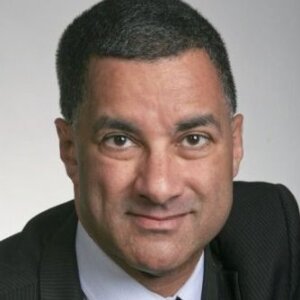What the two leading Jewish heroes of 2022 have in common

Graphic by Angelie Zaslavsky
If there is one thing nearly every human being who is even remotely aware of world events would agree upon this week, it’s that Volodymyr Zelenskyy is a hero.
Just as most reached the same consensus in January about Rabbi Charlie Cytron-Walker, who engineered escape for himself and several congregants after hours being held hostage by a gunman in their Texas synagogue.
Rabbi Charlie is 46, President Zelenskyy is 44. They are both married (Zelenskyy’s wife is Olena, Cytron-Walker’s Adena) and fathers of two. They each took somewhat circuitous paths to their current occupations. Zelenskyy, as a comedian-turned-president, and Cytron-Walker as a progressive rabbi from the North in a Southern shul (and now headed to another).
And both, of course, are Jewish.
In truth, such coincidental attributes could describe many, many people. More striking are the similarities between the way they handled the terrifying situations they found themselves in.
Both men were outgunned facing a deadly adversary. For the rabbi, it was a single intruder with a semi-automatic pistol over 11 hours in a hallowed sanctuary. For the president, it’s tens of thousands of soldiers sweeping through his country under the control of the year’s nominee for the world’s leading despot.
How each faced those very different terrors may at first seem to set them apart. For Rabbi Charlie, the main defensive weapon was empathy, which he extended to the very man threatening to kill him and three congregants. In return, their captor showed him respect, calling the rabbi “a good man,” though those assurances were jarred by the gunman’s unbalanced mood swings and unpredictability. Seizing the right moment, the rabbi distracted him by throwing a chair to enable their escape.
In what is far more severe than an 11-hour standoff (unless you are the one being held), Zelenskyy has rallied his people with steadfast defiance.
In videos posted to social media, he appears in military garb and unshaven, on the streets of Kyiv or drinking coffee with troops. He helped unite European leaders to enact the most sweeping sanctions in memory when he joined their meeting via videoconference and declared, “This might be the last time you see me alive.” When Washington offered to evacuate him, his Churchillian response – “I need ammunition, not a ride” – was inspiring.
Just as Rabbi Charlie made tea for the unknown visitor before that person pulled a gun, Zelenskyy also attempted to defuse his potential adversary before the invasion, meeting in person with Russian President Vladmir Putin late in 2019 to relieve tensions over the Russian-backed separatist areas of Eastern Ukraine.
And barely two weeks ago on the eve of the invasion, Zelenskyy again extended the offer, saying, “I don’t know what the president of the Russian Federation wants, so I am proposing a meeting.”
Magnamious as it was, that show of empathy was wasted on Putin, whose capacity for human decency is clearly far less than a gunman’s in a synagogue.
The Colleyville analogy ends with the reality that the Russian war on Ukraine is very much ongoing, possibly on a timeline equivalent to the afternoon of the synagogue takeover, or even still the morning. And there’s no guarantee that Zelenskyy will find an analogous chair to throw at his attackers. As horrific as the synagogue incident was, it didn’t hold the fate of a nation, or nations, or nuclear annihilation, in the balance.
But you can’t discount the qualities shared by the two Jewish leaders: Character, integrity, resolve, championing for the underdog and respect for innocent lives.
There are obviously Jewish values in this, which I’m sure I can Google to find an applicable midrash. But I’ll leave that to the Torah scholars this time — except to say I know a mensch when I see one. Or two.
















